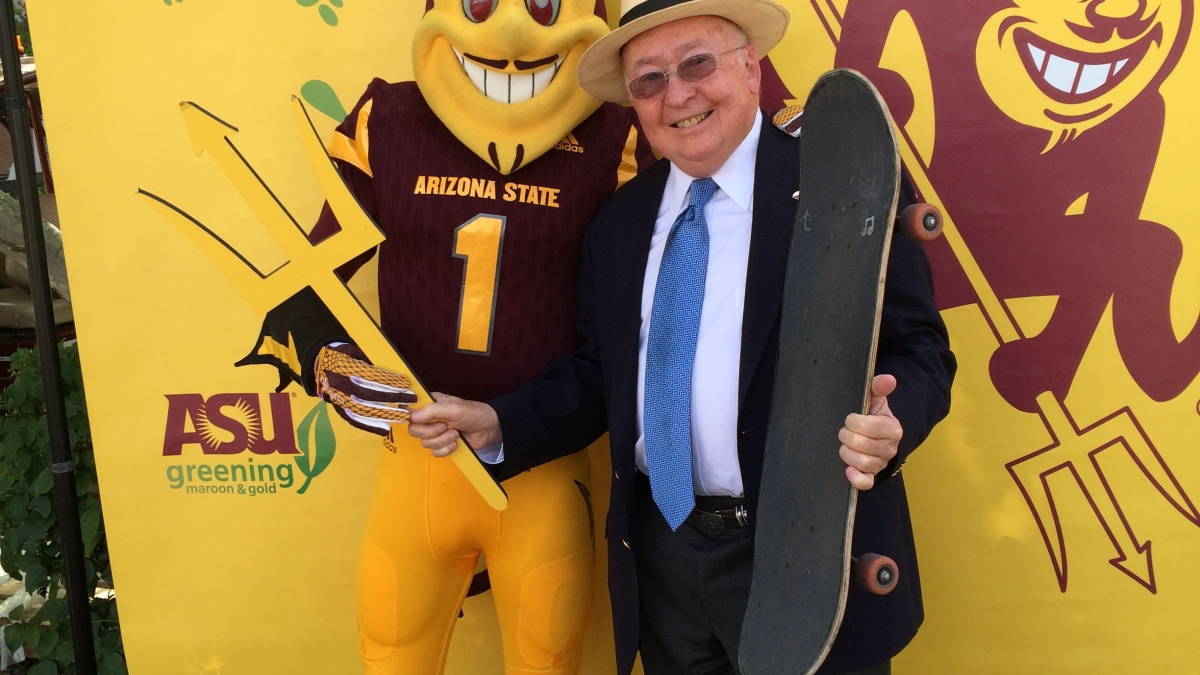Faculty associate uses trading experience to teach negotiations to global studies students

Sparky and Herb Roskind.
When Herbert Roskind and his wife, Laura, moved to Arizona from Massachusets in 1997 after his retirement, they were looking for a way to get involved in their new community. So the Roskinds started taking courses at Arizona State University aimed at adult learners, where he met professors in a wide array of fields.
Seeing the impact that the university had on its students and the larger community, Roskind knew that he wanted to also be a part of the ASU family.
“Starting here, I foresaw ASU was really going to go someplace,” he said. “We feel that ASU has adopted us, and we’re glad to be adopted.”
Through the courses he was taking, Roskind met Roger Adelson, now an emeritus professor in the School of Historical, Philosophical and Religious Studies. Adelson suggested that Roskind use his lifelong career experience in chemical commodity trading to teach a course at ASU.
Soon after his conversation with Adelson, Roskind received a call from David Jacobson, the founding director of the School of Global Studies, which would eventually merge into the School of Politics and Global Studies. Jacobson thought that the potential course would be an ideal match for global studies students given Roskind’s global experience.
Although unsure at first, Roskind agreed to work with faculty to form a syllabus for his course Negotiating Global Trade, now known as Global Trade in Real Time.
He has taught his class now for over a decade at ASU as a faculty associate. Accounting for cultural differences, the supply chain management course emphasizes negotiations, which according to Roskind are the most important skill a global studies student can learn.
He hopes that through his course, students from The College of Liberal Arts and Sciences can gain some business literacy and inspiration for how they might use their degree in their careers.
An English graduate from Dartmouth, Roskind himself was a student from a liberal arts program. After his freshman year, he changed his major from chemistry since he found it to be too formulaic.
“I need something that doesn’t have a formula,” Roskind said. “They were teaching me the basics, and the basics bored me.”
English was a perfect fit for Roskind, who loves diving deep into topics and asking questions to find underutilized opportunities.
“A good education makes you look at a piece of paper and say, ‘What’s going on?’”
Roskind, having earned his English degree, was determined to see the world. He began his career by walking down Wall Street and into the Cunard Building.
“I knew they owned big ships,” Roskind said. “I literally knocked on doors until I found one that was very receptive. You couldn’t do that today.”
He got his start in the shipping room of Associated Metals and Minerals. He would go on to start his own chemical trading company, along with a series of other chemical businesses, taking him to places around the world like China, Japan and Europe. Roskind ultimately started five businesses: HoltraChem Inc., CalChor Inc., Carolina Nitrogen Inc., General Plastics Inc. and Technin Inc.
Problem solving and relationship building were keys to his success — skills that Roskind aims to teach in his course at ASU.
Learning goes beyond the classroom, according to Roskind, who encourages students to form connections with classmates or get involved through sports or clubs. Networking, he says, is a life skill, not just in business.
“I learn as much from our students or maybe more than they do from me,” Roskind said. “So much stuff is possible, and it doesn’t make any difference what you study.”
Throughout his time teaching, Roskind has formed lasting relationships with a number of students, many of whom went on to become entrepreneurs themselves. He shared that he’s happy that some of his students wanted to continue their mutual education.
Beyond teaching, Roskind and his wife serve on numerous boards, including the School of Politics and Global Studies, the Institute of Human Origins and many more.
He joined the recently formed School of Politics and Global Studies Advisory Board because to Roskind, politics makes a big difference — they happen on a global scale and are extremely complex.
“What we are doing in this school is focusing them on the problems to be solved and how they’re going to be solved,” Roskind said. “That’s the reason this school is very important.”
Whether it be through relationships, service, teaching or financial donations, Roskind is making an impact on students and alumni at ASU.
“Values are how one lives one’s life,” Roskind said. “So many people identify themselves with their occupation. It should, in my opinion, be identified with values. That’s who you really are.”
More Law, journalism and politics

Annual John P. Frank Memorial Lecture enters its 26th year
Dahlia Lithwick, an MSNBC analyst and senior legal correspondent at Slate, is the featured speaker at the School of…

The politics behind picking a romantic partner
A new study reveals the role that politics play when picking out a romantic partner — particularly for older adults.“Findings…

Tips to make tax season less taxing
When it comes to highly unpleasant experiences, filing taxes is probably up there with root canals — which is why people put off…

